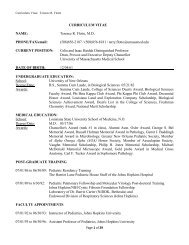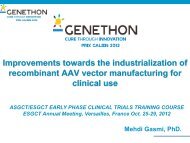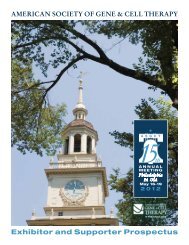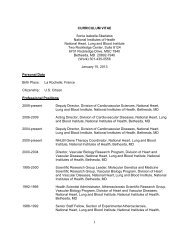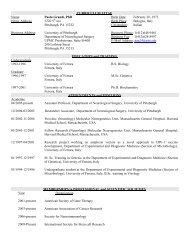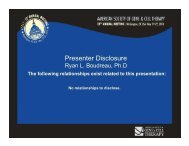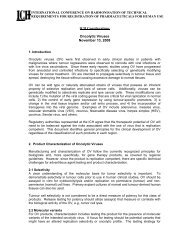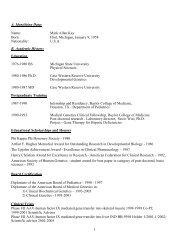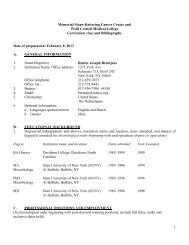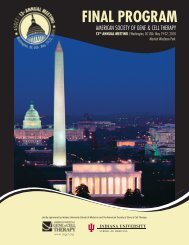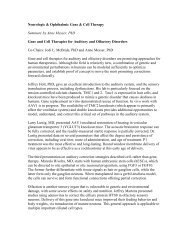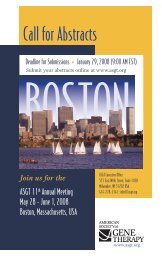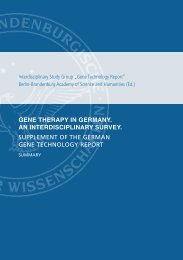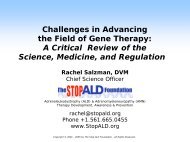FINAL PROGR AM - American Society of Gene & Cell Therapy
FINAL PROGR AM - American Society of Gene & Cell Therapy
FINAL PROGR AM - American Society of Gene & Cell Therapy
You also want an ePaper? Increase the reach of your titles
YUMPU automatically turns print PDFs into web optimized ePapers that Google loves.
28<br />
8th Annual Meeting • June 1 - 5, 2005 • St. Louis<br />
SCIENTIFIC <strong>PROGR</strong><strong>AM</strong><br />
WEDNESDAY, JUNE 1, 2005<br />
EDUCATION SESSION III – 8:30 PM - 10:00 PM<br />
Education Session 120<br />
Novel Vector Systems<br />
Novel adenovirus and adeno-associated virus vectors have been<br />
developed recently, which enable the delivery <strong>of</strong> transgenes into<br />
target cells and tissues with efficiency and specificity. Application <strong>of</strong><br />
these novel vectors in the delivery <strong>of</strong> therapeutic genes to treat<br />
inherited disorders as well as acquired diseases like cancer will be<br />
discussed.<br />
Room: 260/264<br />
Chair: Savio L.C. Woo, PhD<br />
Speakers: Andre Lieber, MD, PhD - <strong>Gene</strong> Transfer Vectors<br />
Based on B-group Adenoviruses<br />
David T. Curiel, MD, PhD - Targetable/<br />
Injectable Adenoviral Vectors for <strong>Cell</strong>-specific <strong>Gene</strong><br />
Transfer In Vivo<br />
Guangping Gao, PhD - Efficient <strong>Gene</strong> Transfer<br />
Vectors Based on Novel Primate AAVs<br />
Education Session 121<br />
AAV Vectors<br />
The goal <strong>of</strong> the AAV Education Session is to provide the<br />
community not only with a general understanding <strong>of</strong> this popular<br />
vector system, but to integrate this into a broader awareness <strong>of</strong><br />
expectations when using these vectors in vitro and in vivo. Three<br />
topics will be discussed in this session. The first speaker will begin<br />
with a general background <strong>of</strong> AAV biology including a discussion<br />
<strong>of</strong> the molecular fate <strong>of</strong> recombinant genomes in vitro and in<br />
vivo. The second topic will concentrate on structural differences<br />
between AAV serotypes and how those differences can be utilized<br />
to improve the vector delivery. The final topic will focus on<br />
applications <strong>of</strong> AAV serotype delivery to specific target organs<br />
including performance comparisons between different serotypes.<br />
Room: 263/267<br />
Chair: Joseph Rabinowitz, PhD<br />
Speakers: Joseph Rabinowitz, PhD - Exploring the<br />
Structure and Function <strong>of</strong> the AAV Virion<br />
Xiao Xiao, PhD - Recent Progress in AAV Vector<br />
Development<br />
K. Reed Clark, PhD - Wild-type and<br />
Recombinant AAV Biology - An Update<br />
Education Session 122<br />
RNAi<br />
RNA interference refers to a cells natural ability to silence gene<br />
expression using short interfering RNAs (siRNAs). Inhibitory<br />
RNAs are derived from larger precursors transcribed from the<br />
genome, or introduced into cells artificially. The power <strong>of</strong> RNAi<br />
has recently been harnessed by the bench scientist to selectively<br />
inhibit the expression <strong>of</strong> diverse gene products to ascertain<br />
biological function, or as therapeutic tools for silencing pathogenic<br />
protein expression. This session will provide an overview <strong>of</strong> the<br />
protein complexes involved in RNAi, and will also illustrate<br />
various methods to accomplish RNAi in cells, tissues and animals.<br />
Room: 240 Complex<br />
Chair: Beverly L. Davidson, PhD<br />
Speakers: Beverly L. Davidson, PhD - RNA Interference<br />
John J. Rossi, PhD - The Long and Short <strong>of</strong><br />
RNAi<br />
Michael McManus, PhD - Developmental and<br />
Post-developmental Phenotypes <strong>of</strong> MicroRNA<br />
Ablation in the Mouse<br />
Education Session 123<br />
<strong>Gene</strong> Transfer to the Central Nervous System<br />
In this session the three speakers will address specific issues<br />
pertaining to gene transfer in the nervous system. The broad goals<br />
are to convey to the audience the anatomic, immunologic and<br />
development aspects <strong>of</strong> the nervous system that are unique as a<br />
target for gene therapy. Dr. Fink will highlight the peripheral<br />
nervous system development, anatomy, function and disease<br />
related dysfunctions. Dr. Maria Castro will address neural<br />
immune interactions, locus <strong>of</strong> antigen presentation and<br />
consequences for gene transfer. Dr. Feder<strong>of</strong>f will touch on special<br />
problems encountered in the translation <strong>of</strong> preclinical gene therapy.<br />
He will also briefly highlight issues related to the development <strong>of</strong><br />
in utero CNS gene therapy.<br />
Room: 230/231<br />
Chair: Howard J. Feder<strong>of</strong>f, MD, PhD<br />
Speakers: Howard J. Feder<strong>of</strong>f, MD, PhD - Translational<br />
Considerations for CNS <strong>Gene</strong> <strong>Therapy</strong><br />
David J. Fink, MD - <strong>Gene</strong> Transfer to DRG for<br />
Treatment <strong>of</strong> Neuropathy or Chronic Pain<br />
Maria Castro, PhD - Regulated, Long Term<br />
Therapeutic <strong>Gene</strong> Expression for Neurological<br />
<strong>Gene</strong> <strong>Therapy</strong>



